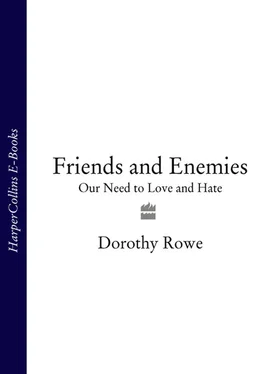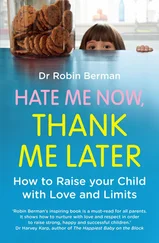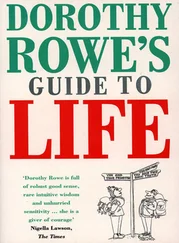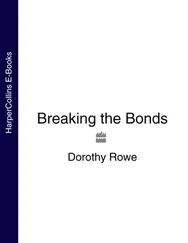I asked my workshop group if there was a talent for friendship and, if so, whether it was innate or learned. They answered:
• ‘I have learned to respect others through therapy. I learned from appropriate modelling of others who have been through similar processes.’
• ‘I haven’t a talent for friendship. I think friendship is learnt; by giving friendship to others one receives friendship back and people benefit and grow.’
• ‘No talent. I was brought up by a puritanical grandmother who allowed no one into the house. No child was quite good enough for me to play with.’
• ‘In the main, we learn how to make friends by observing others, initially our parents and siblings and, as we get older, our peers and work colleagues. To observe the making of a friendship by others teaches us to behave in a fashion to create our own.’
• ‘I grew up with no social skills apart from being polite. My best friend grew up with good social skills and she became my role model.’
• ‘I think I have a talent for friendship because I am open and honest and I have a great faith in people. Unfortunately this sometimes leads to my downfall because other people then hurt me.’
• ‘I value friendships highly. Because I think friendships are important I think I make a good friend.’
• ‘I think that I probably choose not to develop any talent I may have for friendship as I do not feel the need for many friends, although I do like other people to accept me in a friendly way as a friendly person.’
Underlying these answers and indeed the words of everyone quoted here is a division which runs like a great fault-line across the world of friendship. It is the line which divides us all into one of two groups, according to how we experience our sense of existence. These groups I have called extraverts and introverts. In my earlier books and especially in The Successful Self I have looked at how this division affects our relationships. What I have said has arisen out of extensive research. I now know that whenever I talk or write about this matter some people, usually those I call introverts, will say, ‘Yes, I recognize myself in what you say,’ and some people, usually those I call extraverts, will not recognize what I say and instead be puzzled or insist that they are a bit of both, no matter how much I explain that it is not a matter of what you do but why you do it. However, it is not surprising that such a difference arises because introverts turn inwards to their internal reality of thoughts and feelings, and thus are likely to be aware of why they do what they do, while extraverts turn outwards to their external reality, where they are more interested in doing than in examining the reasons why.
Other people are of enormous importance to extraverts because extraverts experience their sense of existence in relationship to other people. Lesley, an extravert, explained this. ‘If you are an extravert who feels in danger of disappearing, friends are vital landmarks on your map who need to be kept in place at all costs. Without them there is the feeling that you don’t exist because you can only get some sense of yourself if it is reflected back at you. It is as though the reflection is real and exists but you do not exist without the mirror of people relating to you. If you feel like that any expenditure of effort on friends is worthwhile.’
The writer Fay Weldon told me, ‘I had the art of placating and always had fans, even as quite a small child. I would always have a little group of supporters who would fight my corner for me with teachers. I just like friends. I just like talking to people, I enjoy conversation. I just went to school because I liked my friends.’ It has always amazed me that Fay ever gets any writing done because her home is always full of people, but she explained, ‘I’ve rather cunningly always surrounded myself with children, which is another way of creating your own world downwards because there isn’t anything particularly solid behind you. So now there are children, and grandchildren, and Nick has three boys – one, fifteen years old, lives with us and the other two visit. I just think I was born sociable and gregarious.’
Extraverts often envy introverts for having – or appearing to have – a deep, still centre, but Lesley clearly does not envy introverts. She wrote,
Then there are those strange people called introverts. I have the feeling that many of these characters are so bound up with what they are doing or thinking and are so happily and securely independent that they don’t realize that extravert partners may feel shut out and neglected. I misunderstood my introvert ex-husband, because he was much more bound up in his medical practice than in what I and the children were doing or feeling. I reached the perfectly logical conclusion that he didn’t care about us. In fact he did and does, but he doesn’t want his family to take up much of his valuable time.
What Lesley was describing here was how introverts experience their sense of existence through a sense of achievement, organization and control. They often lack the social skills which extraverts acquire so easily.
Some introverts do learn the art of being sociable. Irene described her progress to me: ‘Control is important to me. Wild emotion and a lot of impinging of emotion I can’t deal with. Sex drives I could understand, but I could never understand why people were dependent on one another. Even as a child I couldn’t. There was all that marvellous, exciting world out there, and so many things to see and do. I resent people who try and restrict me from being myself, from doing what I want to do. It took me a long time to be part of a group. Right up until I was fifty I hated groups, but gradually I’ve learned to cope. I’ve done it, I feel, successfully, and it’s been a great help in my life. I remember talking to you years ago – I’d just turned thirty-six, I think, and I said to you, I just suddenly felt that everybody else felt the same sort of inadequacies, fear and anxiety as I did. I didn’t feel isolated any more. Because that’s what I felt before, that I felt this and everybody else was going along having a great time. I think that gradually in the eighties – it was doing those various personal development courses and group activities – I realized more fully that everybody’s much the same. It was good to learn to work with a group and accept a role in that group, and usually, if I’m not the leader, I’m close to the leader. I would hate to be without friends. The fact that they exist and are part of the circle that I can relate to is very comforting to me. I haven’t got perfect friends, but I’m not a perfect friend either. I can be happily occupied by myself, fiddling around with paints and looking at things, but friendships are part of the pattern of my life.’
Extraverts, as Lesley described, need other people to maintain their sense of existence, and introverts, as Irene mentioned, need other people to reduce their sense of isolation, but for extraverts relationships with other people are their top priority while for introverts the top priority is a sense of achievement. Of course, everyone wants both – good relationships and a sense of achievement – but often life forces us to choose between them. If we are wise we know what our top priority is and we make sure we fulfil it in some way. No matter how vast Fay’s work commitments are she always surrounds herself with family and friends. When Irene was diagnosed with lung cancer she chose not to go immediately into treatment. Instead she flew to Paris from Sydney to spend two weeks touring the art galleries. What mattered most to her was exploring ‘that marvellous, exciting world out there’.
Opposites, so they say, attract, and where love and sex are concerned a couple is always a pairing of an introvert and an extravert. We see in the other something we do not have. The central character in Tim Lott’s White City Blue is Frankie, an estate agent and an extravert. He says of himself,
Читать дальше












